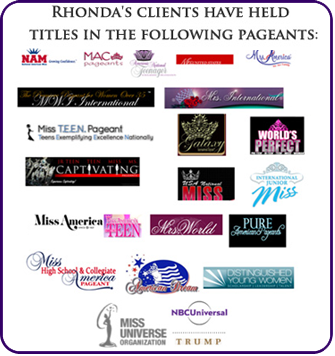 Today, reality TV shows are numerous; and pageants aren’t left out. Mrs. America, Mrs. World, Miss America, Miss USA, Miss Universe, Miss Teen USA, Little Miss Perfect, MTV’s MADE, and Toddlers and Tiaras have all had their share of TV coverage. But how does what you see on your screen compare to the real event?
Today, reality TV shows are numerous; and pageants aren’t left out. Mrs. America, Mrs. World, Miss America, Miss USA, Miss Universe, Miss Teen USA, Little Miss Perfect, MTV’s MADE, and Toddlers and Tiaras have all had their share of TV coverage. But how does what you see on your screen compare to the real event?
Here’s the reality about television. TV stations are in business to make money. Even if their intentions are honorable, if they don’t make a profit, they won’t stay in business. Networks make their money from the commercial ads they sell. Companies will pay to have their commercials run during TV shows that have the highest number of viewers watching them.
But, people are not going to watch boring programs. They want to watch something interesting, exciting, inspirational, dramatic, entertaining, or controversial; anything to help them escape from the dull routine of their normal lives. TV is primarily an entertainment medium. What makes Reality TV so magnetic is that the actors are usually ordinary people who we can relate to; or in some cases, people we already know.
My first exposure to television filming was at age 14 when I was on the Jerry Lewis Telethon. At age 19, I was part of a Coca-Cola sponsored tour of Japan. This meant major media coverage the entire two months we were there. When we were performing in Nagoya, the TV network asked if they could follow one of the performers for the entire seven days we were there to make a 60 minute documentary about our international group. The answer was yes, and I was the cast member chosen.
For 7 days, I had my own 6 man Japanese TV crew following and filming my every move. They were there when I woke up and they put me to bed at night. I learned being a celebrity wasn’t all it was cracked up to be and that I really valued my privacy. Again, when you’re an adventurous 19 year old, your tolerance level is pretty high. After all, doesn’t everyone want their 15 minutes of fame on TV?
But this is when I started to understand that there can be a dramatic difference between what really happens and how those same events are manipulated and portrayed on television. TV producers can edit events and comments to create a scene that varies from the event that actually occurred. For example, if they want an inspiring story, then they’re only going to air the footage that will emotionally move the audience. However, if they want drama, then that’s what they’re going to seek out; and that is precisely what will be created by editing the footage they have to support their vision.
The year I competed at Mrs. America, Women’s Entertainment Television (We TV) produced and aired the Mrs. America pageant on their network. There were two different worlds revolving during the 15 days we were in Palm Springs. There was the taping and producing of a TV show; and the pageant competition. Most of the time spent was on the taping of the TV show.
TV can be fun and exciting. It’s great exposure and reaches millions of people. If you find yourself competing in a pageant that’s going to air on TV, here are some things to keep in mind:
- TV is a controlled environment. What gets shown is totally determined by the angle the producer has chosen.
- Things are taped and re-taped multiple times. This is very time consuming so be patient.
- Many times, people are told what to say and how to say it. Or, they’re asked to say the same lines in different ways. Then the producers will pick which one they want to include.
- Hours of filming are edited into seconds on the screen. Remember, they’re looking for the parts to create their particular spin on the story.
- You have full control over what you say and what you do. It’s your choice as to what rules you choose to play the game by. Never do and say anything that goes against your judgment or moral character.
- Nothing you say or do is off the record. Remember this if nothing else. The cameras are always rolling and anything you say or do is free game and may appear on the show.
By Rhonda Shappert
December 14, 2010 07:02




